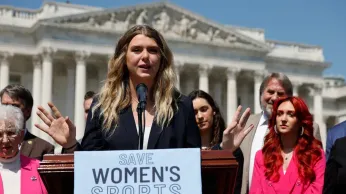
Sep 26
Federal Lawsuit and Legislative Deadlock Put Maine at Center of National Debate Over Transgender Athletes
READ TIME: 3 MIN.
Federal Lawsuit Targets Maine’s Transgender Athlete Policy
The state of Maine is at the forefront of a high-profile legal and political battle over the participation of transgender athletes in school sports. On April 16, 2025, the U.S. Department of Justice, under the Trump administration, filed a lawsuit against Maine, arguing that the state’s policy of allowing transgender students to compete in girls’ and women’s sports constitutes a violation of Title IX, the landmark federal law barring sex-based discrimination in federally funded education programs. The Justice Department claims that prioritizing gender identity over what it terms “biological reality” undermines fair competition for female athletes and exposes them to potential harms, both physical and psychological .
Attorney General Pam Bondi announced the lawsuit at a press conference, joined by Riley Gaines, a former collegiate swimmer and vocal critic of transgender participation in women’s sports. The complaint highlights specific examples from Maine, including cases where transgender girls outperformed their peers in competition, and alleges that such outcomes would not have occurred if athletes competed according to their sex assigned at birth .
Legislative Showdown in Augusta
The federal lawsuit comes amid ongoing, heated debate in the Maine Legislature over bills aimed at restricting the participation of transgender athletes. On June 13, 2025, the Maine House of Representatives narrowly passed a bill, LD 233, that would ban transgender girls and women—defined in the bill as those assigned male at birth—from participating in school or college sports designated for females. The vote followed hours of emotional testimony from both sides and a series of failed attempts to advance similar bills earlier in the day .
Supporters of the legislation, such as Republican Rep. Dick Campbell, frame the bill as a necessary response to protect the integrity of women’s sports and ensure fairness. Opponents, however, argue that such measures promote discrimination and further marginalize transgender youth, who are already a small and vulnerable population in Maine’s schools. According to Rep. Amy Kuhn, co-chair of the Judiciary Committee, only two to four transgender athletes competed on high school teams out of tens of thousands of student athletes statewide this year .
The Maine Senate, controlled by Democrats, has rejected similar bills, setting up a potential legislative impasse. During public hearings, athletes and advocates from across the state shared personal stories, both in support of and opposition to the proposed bans, highlighting the deeply personal stakes involved in the policy debate .
Community Response and Advocacy
The rapid succession of legislative proposals has galvanized advocacy organizations, civil rights groups, and everyday Mainers. On June 17, 2025, the Maine Legislature ultimately rejected eight bills targeting transgender student athletes and the broader transgender community, following coordinated activism from coalitions such as EqualityMaine and legal advocates .
"Thousands of Maine people showed up at the State House, called and emailed their legislators and stood strong against eight different bills that targeted our community," said Gia Drew, Executive Director of EqualityMaine. She emphasized the resilience of the state’s Queer community and reiterated that transgender people in Maine are not alone .
During these debates, opponents of the bans have pointed out that there is little evidence of widespread problems caused by the participation of transgender athletes. The executive director of the Maine Human Rights Commission, Kit Thomson Crossman, noted that the commission could not recall any cases involving transgender athletes brought before them, suggesting the issue is more political than practical .
Broader Implications and Ongoing Debate
The situation in Maine reflects the broader national conflict over transgender rights, sports policy, and federal law. While proponents of restrictive legislation argue they are protecting women’s rights and upholding Title IX, civil rights advocates counter that such bills weaponize the law against transgender students and ignore the chronic underfunding and other violations of Title IX that affect all student athletes .
As the legal battle moves forward and the Maine Legislature continues to debate, transgender athletes, their families, and allies remain at the center of a contentious and highly visible struggle. The outcome in Maine is likely to influence the direction of similar debates across the country, with significant implications for the rights of transgender students and the future of youth sports in America.






